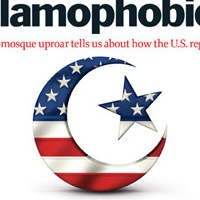![]()
2008 | JCPA.org | Edited by Manfred Gerstenfeld
Behind the Humanitarian Mask: The Nordic Countries, Israel, and the Jews
In the past decades many pioneering efforts to demonize Israel have come from elites of the Nordic countries. The motifs of this anti-Israelism are similar to those of classic anti-Semitism, of which it is a new mutation. Such highly discriminatory prejudices are in particular expressed in Norway and Sweden by leading socialist and extreme-leftist politicians as well as journalists, clergy and so-called humanitarians.
Behind the Nordic countries’ appearance and oft-proclaimed concern for human rights lurk darker attitudes. This book deals mainly with lifting the humanitarian mask as far as Israel and Jews are concerned. This disguise hides many ugly characteristics such as false morality, a pretense of superiority, as well as profound humanitarian racism.
The best-known Swedish statesman of the postwar period, Olof Palme was one of Europe’s first prominent Holocaust inverters. He was at the origin of the permeation of anti-Israelism in segments of the Social Democrats, Sweden’s classic government party.
In recent years major anti-Semitic incidents have taken place in Norway even though there are very few Jews there. The country is a European leader of anti-Semitic cartoons, sometimes similar to Nazi ones. Norway is one of the very few countries that forbids Jewish ritual slaughter. At the same time, it is one of only three countries in the world that permit the cruel killing of whales.
In this book, thirteen essays and interviews discuss various aspects of the attitudes of Sweden, Norway, Denmark, Finland, and Iceland toward Israel and the Jews.
Excerpt from the book’s introduction:
The Nordic countries rarely draw international attention. The five nations discussed in this book cover a large geographic area yet have a combined population of only about twenty-five million. Sweden is the largest with 9.2 million inhabitants. The two other Scandinavian countries, Denmark and Norway, have populations of 5.5 million and 4.6 million, respectively. Finland has 5.2 million inhabitants and Iceland 0.3 million.
Scandinavians comprehend each other’s languages with more or less effort. Outside these three countries, the languages are understood by few people. Finnish is far less accessible.
These five countries are seen as a bulwark of democracy. They have constructed peaceful images with advanced welfare policies and major concern for human rights. On the Global Peace Index, for instance, Norway is ranked first, Denmark third, Finland sixth, and Sweden seventh among 121 nations. These countries usually also rank high on other indices. According to Reporters without Borders, Denmark, Finland, Iceland, and Norway are equal among the eight nations having the greatest press freedom. Sweden is between eleventh and fourteenth.
However, the Simon Wiesenthal Center’s latest report on the investigation of Nazi war criminals yields a different picture. Both Norway and Sweden can be found in the F1 category — one of the worst — together with Syria. This category comprises “those countries which refuse in principle to investigate, let alone prosecute, suspected Nazi war criminals because of legal (statute of limitation) or ideological restrictions.”
International knowledge about these nations is superficial. When university students who have never visited these countries are asked to write down all they know about them, only very few will reach a hundred words. In such experiments done by this author with North Americans about Norway, several of them could only come up with a sentence or two, which then often turned out to refer to Sweden or Denmark. Once I told this to a group of well-educated Americans who laughed. Then one of them said: “Hans Christian Andersen — was he Swedish?” No one reacted, so I had to say, “No, he was Danish.”
These countries are rarely mentioned internationally and, if so, it is often in a positive context. This is the more so as few foreign journalists are based there. To the visiting tourist their populations frequently come across as polite, helpful, and soft-spoken.
Darker Attitudes
Behind this appearance and the often proclaimed concern for human rights lurk darker attitudes. This book deals mainly with lifting these countries’ humanitarian mask as far as Israel and Jews are concerned.
To avoid misunderstanding: these nations have also supported many initiatives that are positive for Jews and/or Israel in recent decades. Some examples should be mentioned in particular. A major one by Sweden was the international promotion of Holocaust education. Its Social Democratic prime minister Göran Persson launched this important process with a conference in Stockholm at the beginning of 2000.
Norway received positive publicity when it became the first county to make payments to Holocaust survivors when the restitution process was renewed at the end of the twentieth century. The country’s ambivalent behavior during the process that preceded the decision on the payments, however, is barely known.
Yet anti-Semitism and in particular its more recent mutation, anti-Israelism — used here interchangeably with anti-Zionism — are widespread in these countries. In Norway and Sweden, anti-Israeli initiatives have been taken that are extreme even in a European context.
This cannot be disconnected from the fact that anti-Semitism is a deeprooted, integral part of European culture and has been promoted systematically and intensely over many centuries, initially by large parts of Christianity and since the nineteenth century by nationalist movements. The infrastructure of this profound, irrational hate has thus existed, in varying guises, for much of Western history.
Click here to read this book for free online.
Published by the Jerusalem Center for Public Affairs (Institute for Global Jewish Affairs) and Friends of Simon Wiesenthal Center for Holocaust Studies.



 RSS
RSS











Behind the Humanitarian Mask: The Nordic Countries, #Israel, and the Jews | #Norway #Sweden #Finland #Denmark http://t.co/zwnYLQW
Behind the Humanitarian Mask: The Nordic Countries, #Israel, and the Jews | #Norway #Sweden #Finland #Denmark http://t.co/zwnYLQW
Behind the Humanitarian Mask: The Nordic Countries, #Israel, and the Jews | #Norway #Sweden #Finland #Denmark http://t.co/zwnYLQW